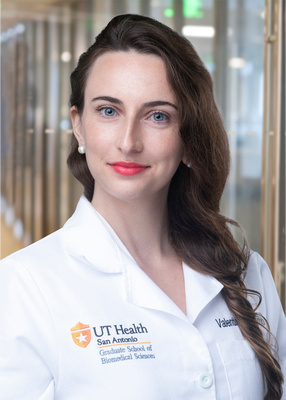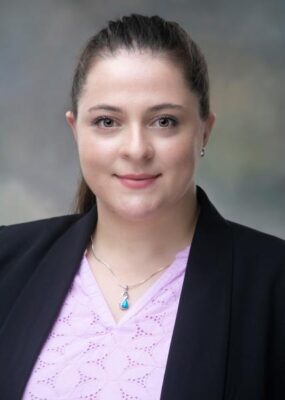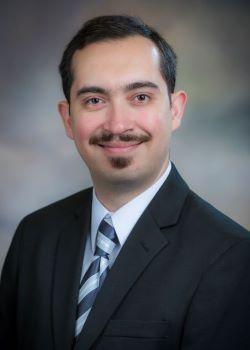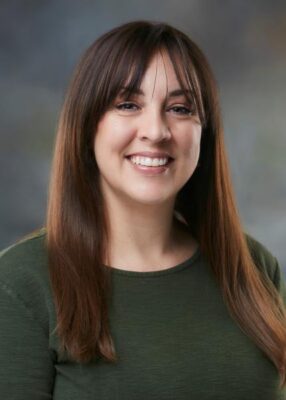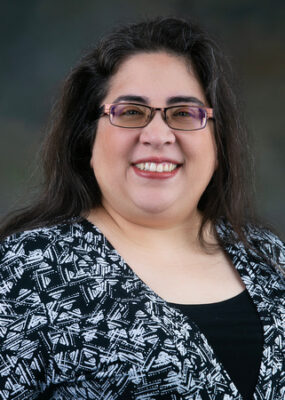TST TL1 Scholars
TST – TL1 2022 Trainees
(July 2022 – June 2023)
Congratulations to Leila Takahashi-Ruiz!!
Leila was awarded the prestigious 2022 Heather Menzie Junior Student of the Year Award at the 2022 GSBS Convocation Ceremonies.
We are proud to have Leila as one of our TL1 Trainees this year!
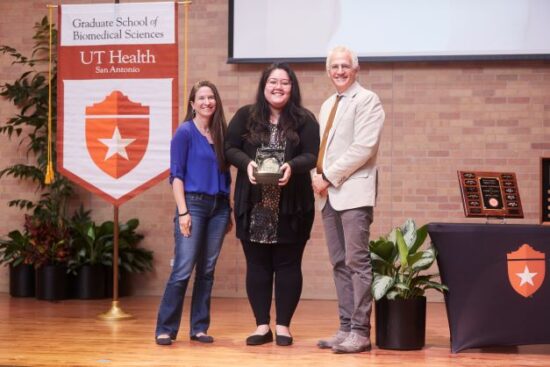
Trainee: Valentina Garbarino, Ph.D.
Affiliation: Postdoctoral Research Fellow, Glenn Biggs Inst. for Alzheimer’s and Neurodegenerative Diseases
Research Interest: Neurodegenerative disorders, Alzheimer’s disease, Neurobiology of Aging, Stress, Biomarkers, Senescence, Therapeutic Interventions
Mentors: Sudha Seshadri, M.D.; Mitzi M. Gonzales Ph.D.
Research Topic: Evaluating salivary lactoferrin as a biomarker for stress in a population of dementia caregivers
Valentina Garbarino graduated with her doctoral degree from the UT Health San Antonio Biomedical Sciences Program in the Physiology and Pharmacology discipline in 2018, supported by a NIA sponsored Biology of Aging T32 Training Grant. Her thesis work utilized mouse models, focused on the developmental and behavioral outcomes of perinatal exposure to medications including Prozac and metformin. Upon graduation she was awarded the Armand J. Guarino Award for academic excellence in doctoral studies. Valentina joined the Glenn Biggs Institute for Alzheimer’s and Neurodegenerative Diseases as a postdoctoral research fellow in 2019. Under the guidance of a carefully curated mentoring team, made up of experts in the field of neurodegenerative disease, she developed skills in clinical research and was able to contribute to teams translating novel therapeutic strategies, including senolytic therapies, from basic science animal models into early clinical trials for Alzheimer’s disease.
With her broadly developed skill set, Valentina is working to establish her own research niche further exploring the link between stress and Alzheimer’s disease in those with a diagnosis and those who are at risk due to family history or caregiver burden. Her second year of support and training from the TST-TL1 program will focus on exploring the association of the salivary protein lactoferrin with stress and perceived burden in a population of dementia caregivers. Lactoferrin is an easily measurable protein which has previously been linked to Alzheimer’s disease, and evidence suggests it may also serve as a biomarker for chronic stress. Establishing a salivary biomarker for stress and psychological burden would provide the opportunity for reproducible identification, and earlier interventions for populations at risk of neurodegenerative disease.
Trainee: Afaf Saliba
Degree Sought: Ph.D.
Program: IBMS – Cell Biology, Genetics, and Molecular Medicine
Research Interest: Metabolic disorders, Diabetes, Chronic Kidney Disease
Mentor: Kumar Sharma, MD, FAHA, FASN; Professor, Chief of the Division of Nephrology; Hillis Chair and Vice-Chair of Research at the Department of Medicine; Director of Center for Renal Precision Medicine
Research Topic: AMPK activation as a therapeutic approach in a mouse model for progressive kidney disease
Afaf is a 4th-year Ph.D. student in Cell Biology, Genetics, and Molecular Medicine with a research interest in metabolic diseases and contributing to therapeutic discoveries. Afaf receives training at the Center for Precision Medicine by Dr. Kumar Sharma with an intense focus on precision medicine and identifying molecular signatures in renal diseases that can guide therapy. Afaf developed a mouse model that will facilitate the identification of therapeutic targets for progressive kidney disease. Her work is gaining recognition at UTHSA and the national level. She was awarded the competitive institutional predoctoral fellowship NIH/NCATS TL1 for two consecutive years. In addition, Afaf received a Translational Science Award from the Association for Clinical and Translational Science (ACTS) as the Outstanding Predoctoral Trainee of 2022 (Chicago). She also received prizes and travel awards, including the Burroughs Wellcome travel award. Afaf is a prominent student leader who serves the student body and the community by promoting kidney health, women empowerment, and leading self-promotion, mental health, and inclusion initiatives.
Trainee: Leila Takahashi-Ruiz
Degree Sought: Ph.D.
Program: Cell Biology, Genetics, and Molecular Medicine Discipline of the Integrated Biomedical Sciences Program
Research Interest: Cancer Pharmacology and Immunology
Mentor: April Risinger, PhD, Associate Professor, Department of Pharmacology
Research Topic: Elucidating the mechanism of eribulin-mediated immunological effects to improve the treatment of triple-negative breast cancer
Leila Takahashi-Ruiz graduated with a Bachelor’s of Science in Biological Sciences from Colorado State University in Fort Collins, Colorado in 2018. During her undergraduate studies, Leila identified research interests in microbiology and immunology whilst also working as a teaching assistant in microbiology, biomedical science, and physics courses. Soon after graduating in the summer of 2018, Leila joined the NIH-funded Post-baccalaureate Research Education Program (PREP) at Virginia Commonwealth University in Richmond, Virginia. Leila worked under the mentorship of Dr. Rebecca Martin and investigated the interaction between allergic disease and helminth infection utilizing a house dust mite mouse asthma model. Through this experience, she identified immunology as her primary research interest but also developed her expertise in cellular and molecular laboratory techniques and gained valuable in vivo experience that carried through to her doctoral training. After completing PREP, Leila joined UT Health San Antonio’s Integrated Biomedical Sciences Ph.D. program in the Fall of 2019. She joined Dr. April Risinger’s lab that focuses on the discovery and development of drugs for the treatment of women’s cancers with particular expertise in drugs that target the cytoskeleton.
Leila is now a fourth-year Ph.D. candidate investigating the immunological effects of microtubule-targeting agents. Unanticipated immunological effects of clinically used microtubule-targeting agents have potential implications in their usage for the treatment of triple-negative breast cancer. The findings of this multidisciplinary research topic are directly translatable because the distinct immunological effects of drugs being actively used in patients can be used to guide their more rational use in the clinic. Leila aims to utilize the training through the Translational Science Training TL1 program to improve the translatability of her findings and potentially have a larger impact on the usage of these compounds in the clinic.
Trainee: Salvador Alejo
Degree Sought: M.D./Ph.D.
Program: Cancer Biology
Research Interest: Cancer Biology, Epigenetics, DNA Repair
Mentor: Gangadhara Sareddy, PhD, Department of Obstetrics & Gynecology
Research Topic: Significance of KDM1A in DNA Damage Response of Glioma Stem Cells
Salvador (Sal) Alejo is a sixth-year student in the South Texas Medical Scientist Training Program (STX MSTP). He graduated with a Bachelor of Arts in Mathematics in 2010 from Harvard University. During his undergraduate studies, Sal performed research in the lab of Dr. Louis Kunkel PhD at Boston Children’s Hospital/Harvard Medical School studying muscular dystrophy. After graduating, he pursued a postbac in Biochemistry at the University of Nevada Las Vegas where, under Dr. Hui Zhang PhD, Sal focused on understanding the role of histone methyltransferases to promote ubiquitin-mediated proteolysis of non-histone proteins. Later, he matriculated into the STX MSTP and completed the first two years of medical school. Sal is currently in his fourth year of predoctoral training under the mentorship of Dr. Gangadhara Sareddy PhD in the department of Obstetrics & Gynecology at UT Health San Antonio. Sal’s proposed work as a TL1 scholar will focus on establishing the potential of Lysine-Specific Histone Demethylase 1A (KDM1A/LSD1) inhibitors as a novel strategy to improve GBM patient outcomes. To do this, he is utilizing patient-derived tissues in vitro and in vivo to study the potential efficacy of KDM1A pharmacologic inhibitors to hinder DNA repair of glioma stem cell and sensitize them to standard of care GBM therapies. He has been highly successful in his research career, with several publications in journals such as Nature Communications, Journal of Biological Chemistry, Breast Cancer Research and Treatment and Cancer Letters, among others. His ultimate career goal is to become a physician-scientist performing innovative translational research to improve the lives of cancer patients.
Trainee: Amber Asher
Degree Sought: Ph.D.
Program: IBMS – Neuroscience, Neuroscience concentration
Research Interest: Psychiatric diseases, substance abuse, cognition, learning and memory in adolescent populations
Mentor: David A. Morilak, Ph.D.
Research Topic: The role of interleukin-6 in docetaxel-induced cognitive impairments in a rodent model of prostate cancer
I have taken a round-about way to get where I am. I started here at UTHSA as an undergraduate working for a new investigator in the Department of Pharmacology where I studied the neurophysiology of schizophrenia. I then switched gears and attended Trinity University and obtained a Master of Art in Teaching degree. After teaching high school biology at two different districts around San Antonio for six years, I desperately missed lab work and the excitement of new discoveries, so I left my job as a teacher to work as a contractor for the United States Army. While working at Fort Sam Houston, I got to work on exciting translational work using stem cells to aid soldiers in the arena of war. I then joined the Ph.D. program at UTHSA under the mentorship of Dr. David Morilak. Here, I started working on his project investigating how treatment for cancer can negatively impact cognition with a specific focus on chemotherapy. In addition to neuroscience, I also love doing anything outdoors with my birddog, Bub.
Trainee: George Parra
Degree Sought: Ph.D.
Program: IBMS – Biochemical Mechanisms of Medicine
Research Interest: Understanding structural and dynamic effects of the EWS-FLI1 interactome on the EWS low complexity domain function
Mentor: David S. Libich, PhD, Assistant Professor in the Department of Biochemistry & Structural Biology
Research Topic: Understanding structural and dynamic effects of the EWS-FLI1 interactome on the EWS low complexity domain function
George Parra is a fourth-year PhD candidate in the department of Biochemistry and Structural Biology. He attended Texas State University in San Marcos for both his Bachelor’s and Master’s studies. During his undergraduate, he researched the impact of charge-charge interactions on intrinsically disordered protein (IDP) backbone extension, using the tumor suppressor, p53 as his model. Realizing his passion lied in asking questions that could be rigorously tested he pursued this journey and soon was awarded the South Texas Doctoral Bridge scholarship at Texas State University to pursue a Master’s of Science in Biochemistry. As a master’s student, he continued his work on charge effects on the tumor suppressor, p53, and the biological relevance of phosphorylation on p53 structure modulation. Alongside that work, he investigated the impacts of temperature and sequence order on protein secondary structure preferences, which resulted in a co- authorship publication. It was during his Master’s studies that he decided his overarching goal is to create a research program aimed at developing a comprehensive understanding of how protein-ligand interactions involving intrinsically disordered proteins (IDP) impact cellular processes. His interests in how alterations in IDP gene expression and structural dynamics contribute to human disease led him to apply to University of Health at San Antonio. At UTHSA he is studying the intrinsically disordered fusion protein EWS-FLI1 under Dr. David Libich. EWS-FLI1 acts as an aberrant transcription factor, driving the pediatric cancer Ewing Sarcoma. His immediate research project revolves around building an interactome dataset for EWS-FLI1, and the effects EWS-FLI1 interacting proteins have on the structural propensities and dynamics of EWS-FLI1. His approach will drive forward the identification and development of new targeted treatments in Ewing Sarcoma, as well as be broadly applicable to other fusion-driven pediatric cancers.
Trainee: Iriscilla Imabary Ayala
Affiliation: Postdoctoral Research Fellow, Medicine Department, Diabetes Division
Research Interest: Liver Physiology, Nonalcoholic Fatty Liver Disease, Type II Diabetes, genetic influence on metabolic diseases
Mentors: Luke Norton, PhD, Assistant Professor, Department of Medicine, Diabetes Division
Research Topic: The Role of TCF7L2 in Hepatic Metabolic Zonation
Iriscilla Ayala graduated with her doctoral degree from University of Texas Health San Antonio in Cellular and Structural Biology in 2019, supported by Ruth L. Kirschstein Predoctoral Individual National Research Service Award. Her doctoral project utilized mouse models, focused on investigating the role of transcription factor 7-like 2 (TCF7L2), a key transcriptional effector of the Wnt pathways, on metabolic zonation of the liver. Single nucleotide polymorphisms within TCF7L2 gene are highly linked to increased type 2 diabetic risk in humans. In mouse models, whole body knockouts of TCF7L2 are postnatally lethal. Therefore, the mouse model was genetically modified to inactivate TCF7L2 in hepatocytes specifically. Under the guidance of her mentoring team, she has developed skills in basic biomedical research and was able to elucidate how TCF7L2 regulates metabolic zonation in the liver lobule. Her current research project now focuses on how TCF7L2 regulates lipid and glutamine metabolism in hepatocytes in a normal and following a choline-deficient amino acid-defined high fat (CDAHFD), a well-established diet to induce fibrosis, steatosis, and steatohepatitis. In preliminary data from human liver biopsies, TCF7L2 expression was reduced patients with increasing fibrosis in nonalcoholic steatohepatitis (NASH).


